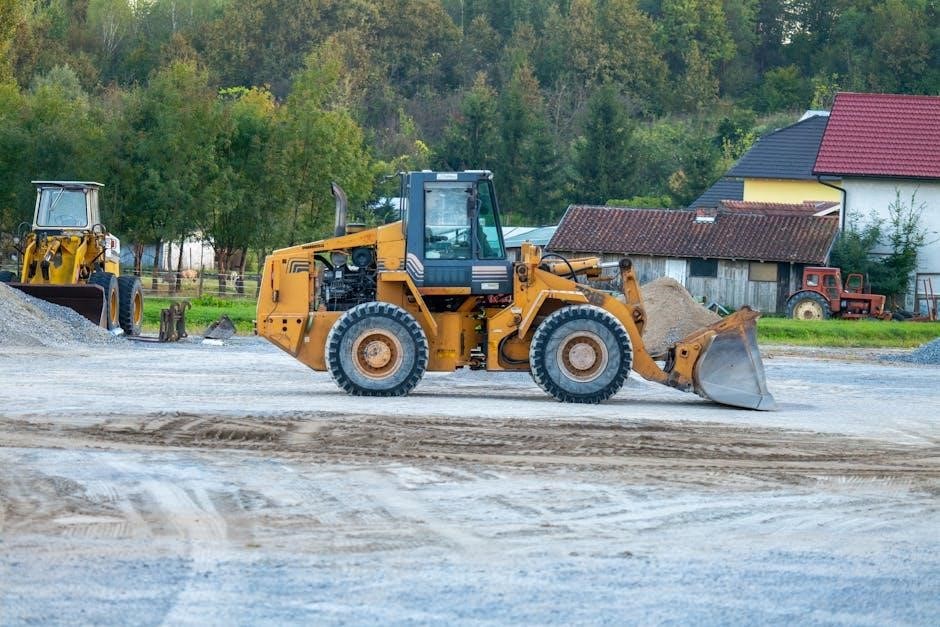
foreman duties and responsibilities pdf
Foreman Duties and Responsibilities
The foreman oversees construction activities, ensuring projects are completed safely, on time, and within budget. They coordinate workers, manage materials, and enforce safety protocols while maintaining quality standards.

A foreman is a crucial figure in construction and project management, serving as the intermediary between site managers and workers. Their primary role involves overseeing daily operations, ensuring tasks are completed efficiently and safely. The foreman is responsible for planning workflows, coordinating subcontractors, and managing materials to meet project deadlines. They also enforce safety protocols and maintain quality standards, addressing any issues that arise. Effective communication and leadership are essential, as they motivate crews and resolve conflicts. The foreman acts as a liaison, reporting progress to higher management while ensuring compliance with legal and company regulations. Their expertise in construction processes and problem-solving skills are vital for smooth project execution. Ultimately, the foreman ensures that projects are delivered on time, within budget, and to the required quality, making them indispensable to any construction team.

Key Duties of a Foreman
A foreman’s key duties include planning, coordinating subcontractors, monitoring materials, ensuring safety compliance, and reporting issues to site managers to ensure efficient project execution.
Planning and Scheduling Work
Planning and scheduling work is a critical duty of a foreman, ensuring projects progress according to timelines. They create detailed schedules, allocate tasks, and adjust plans as needed to meet deadlines. By analyzing project requirements and resource availability, foremen optimize workflows, minimizing delays. They also coordinate with subcontractors and crews to align activities, ensuring all phases are executed efficiently. Effective planning involves identifying potential bottlenecks and developing contingency strategies. This role requires strong organizational skills and the ability to prioritize tasks effectively. Foremen must also communicate schedules clearly to team members, ensuring everyone understands their responsibilities and timelines. Through meticulous planning, foremen play a pivotal role in achieving project goals and maintaining productivity.
Coordinating Subcontractors and Crews

Coordinating subcontractors and crews is a vital responsibility of a foreman, ensuring seamless collaboration and efficient project execution. They act as the primary point of contact, scheduling subcontractors’ work to align with project timelines. Foremen communicate effectively with all parties, clarifying expectations and resolving conflicts promptly. They oversee the allocation of tasks, ensuring each crew and subcontractor understands their roles and deadlines. This coordination involves monitoring progress, addressing delays, and adjusting schedules as needed. Foremen also ensure that all subcontractors adhere to safety protocols and quality standards. By maintaining open communication and fostering a collaborative environment, foremen optimize teamwork and productivity, driving the project toward successful completion. Their ability to manage diverse groups ensures that all aspects of the project are executed harmoniously.
Monitoring Materials and Equipment Usage
Monitoring materials and equipment usage is a critical duty of a foreman, ensuring efficient resource allocation and minimizing waste. They track inventory levels, ensuring adequate supplies of materials and tools for ongoing tasks. Foremen also verify that equipment is in proper working condition, scheduling maintenance as needed to prevent downtime. They enforce proper usage of tools and machinery, adhering to safety standards and operational guidelines. By closely overseeing material distribution, foremen prevent misuse or theft, ensuring resources are allocated effectively. They also identify discrepancies in material orders and address them promptly. This oversight guarantees that projects progress smoothly, with all necessary resources available when needed. Effective monitoring of materials and equipment not only enhances productivity but also contributes to the overall success of the construction project by optimizing resource utilization.
Ensuring Safety Compliance
Ensuring safety compliance is a paramount responsibility of a foreman, requiring constant vigilance and proactive measures to maintain a hazard-free work environment. They enforce adherence to safety protocols, conduct regular site inspections, and address potential risks immediately. Foremen ensure all workers follow safety regulations, use personal protective equipment (PPE), and participate in mandatory training sessions. They also collaborate with safety officers to implement company and legal safety standards, ensuring compliance with HSE legislation. In case of incidents, foremen lead investigations and implement corrective actions to prevent future occurrences. Their leadership fosters a culture of safety, reducing accidents and ensuring operational continuity. By prioritizing safety compliance, foremen protect both personnel and assets, contributing to the successful execution of construction projects. Their role is pivotal in safeguarding the well-being of the entire workforce while meeting project objectives effectively.
Reporting Issues to Site Managers
Reporting issues to site managers is a critical duty of a foreman, ensuring transparency and prompt resolution of problems. They identify and communicate delays, safety hazards, or resource shortages, providing detailed updates. Foremen prepare and submit reports, highlighting key challenges and potential solutions. They maintain clear communication channels, ensuring site managers are informed to make timely decisions. This responsibility includes documenting incidents, progress, and concerns, ensuring accountability and visibility. By reporting issues efficiently, foremen enable site managers to address problems before they escalate, fostering smooth project execution. Their role in maintaining open lines of communication is vital for resolving conflicts and ensuring project goals are met. Regular updates and proactive reporting are essential skills for a foreman to uphold project efficiency and team coordination effectively.

Responsibilities of a Foreman
A foreman’s responsibilities include supervising construction activities, managing site operatives, and ensuring quality control. They allocate tasks, maintain safety, and enforce compliance with legal standards and company policies effectively.

Supervising Construction Activities
Supervising construction activities is a core duty of a foreman. They oversee all on-site operations, ensuring that work progresses according to plans and timelines. This involves monitoring the execution of tasks, addressing delays, and resolving issues promptly. The foreman also ensures that all construction activities comply with safety regulations and quality standards. They work closely with contractors, subcontractors, and crew members to maintain order and efficiency. Effective supervision by the foreman is crucial for achieving project goals and meeting client expectations. By being actively involved in daily operations, the foreman plays a vital role in the successful completion of construction projects. Their hands-on approach ensures that every aspect of the work is executed to the highest standards.
Managing Site Operatives
Managing site operatives is a key responsibility of a foreman. They are tasked with directing and supervising workers to ensure maximum productivity and adherence to safety protocols. This includes assigning tasks, monitoring performance, and providing guidance to crew members. The foreman also handles attendance tracking, skill development, and addressing any disciplinary issues. They foster a positive work environment, encouraging teamwork and open communication. By effectively managing site operatives, the foreman ensures that all workers are aligned with project goals and company standards. This role is essential for maintaining workflow efficiency and achieving high-quality results in construction projects. The foreman’s leadership directly impacts the overall success of the site operations.

Maintaining Quality Control
Maintaining quality control is a critical duty of a foreman. They ensure that all construction work meets the required standards and specifications. This involves conducting regular inspections of completed tasks to verify compliance with project plans and safety regulations. The foreman also checks materials and equipment to ensure they are in good condition and suitable for use. By addressing any defects or discrepancies promptly, the foreman prevents potential issues from escalating. Additionally, they enforce company and legal standards, promoting a culture of excellence on-site. Effective quality control not only enhances the final product but also reduces the risk of rework and improves client satisfaction. The foreman’s attention to detail and commitment to quality are essential for delivering successful construction projects.
Allocating Daily Tasks
Allocating daily tasks is a fundamental responsibility of a foreman, ensuring that all team members are productively engaged and that project timelines are maintained. The foreman begins by reviewing project plans and identifying priorities for the day. They then assess the skills and strengths of crew members to assign tasks accordingly, maximizing efficiency and productivity. Clear communication is essential, as the foreman provides detailed instructions and sets expectations for completion. Throughout the day, they monitor progress, address any bottlenecks, and adjust task assignments as needed. By effectively delegating responsibilities, the foreman ensures that work is completed safely, on time, and to the required quality standards. This role requires strong organizational and interpersonal skills to manage diverse tasks and crew dynamics effectively.
Ensuring Compliance with Legal and Company Standards
A foreman must ensure that all construction activities comply with legal regulations and company policies. This involves conducting regular site inspections to identify potential violations and implementing corrective actions. They enforce safety protocols, such as the use of personal protective equipment and adherence to hazard control measures. The foreman also ensures that all documentation, including safety records and compliance reports, is maintained accurately. Additionally, they verify that subcontractors and crew members follow established guidelines, providing training when necessary. Compliance with environmental regulations, labor laws, and quality standards is also a key focus. By upholding these standards, the foreman protects the company from legal risks and contributes to a safe, efficient, and ethical work environment. This responsibility demands a thorough understanding of relevant laws and company policies, as well as strong leadership to enforce them effectively.

Skills and Qualifications Required
A foreman must possess strong leadership, communication, and problem-solving skills, with detailed knowledge of construction processes and safety regulations. Physical stamina and organizational abilities are essential for effective site management.
Leadership and Communication Skills
Effective leadership and communication are cornerstone skills for a foreman, enabling them to guide crews, resolve conflicts, and ensure clear understanding of tasks and expectations. Strong verbal and written communication fosters collaboration and accountability among team members. A foreman must lead by example, maintaining a positive attitude and motivating workers to achieve project goals. They should also actively listen to crew members’ concerns, providing constructive feedback to enhance performance. Excellent interpersonal skills help build trust and rapport, which are vital for maintaining morale and productivity on site. Additionally, a foreman must communicate effectively with project managers, subcontractors, and clients to align project objectives and address issues promptly. These skills ensure seamless coordination and successful project execution.
Knowledge of Construction Processes and Safety Regulations

A foreman must possess in-depth knowledge of construction processes, including scheduling, material management, and quality control. They should understand the technical aspects of the trade and stay updated on industry best practices. Additionally, a strong grasp of safety regulations is crucial. Foremen are responsible for enforcing compliance with OSHA standards, conducting safety inspections, and ensuring all safety protocols are followed. They must identify potential hazards and implement measures to mitigate risks, creating a safe working environment. Familiarity with legal requirements and company policies ensures adherence to all applicable standards. This expertise allows the foreman to make informed decisions, prevent accidents, and maintain compliance, ultimately contributing to the successful and safe completion of construction projects.
Problem-Solving and Decision-Making Abilities
A foreman must excel in problem-solving and decision-making to address unexpected challenges on construction sites. They must quickly assess situations, such as material shortages, equipment malfunctions, or delays, and devise practical solutions to keep projects on track. Strong analytical skills are essential to identify root causes of issues and implement effective remedies. Foremen must also make sound decisions regarding crew allocation, task prioritization, and resource management to ensure efficiency and productivity. Their ability to think critically under pressure helps maintain project timelines and budgets while minimizing downtime. Effective problem-solving ensures safety, quality, and compliance with standards, ultimately contributing to the successful completion of construction projects. These skills are vital for resolving conflicts, addressing subcontractor issues, and adapting to changing project requirements.
Time Management and Organizational Skills
Effective time management and organizational skills are critical for a foreman to ensure projects run smoothly and efficiently. They must prioritize tasks, create detailed schedules, and allocate resources to meet deadlines. Foremen oversee multiple activities simultaneously, requiring strong organizational abilities to track progress and adjust plans as needed. They must efficiently manage their own time and that of their crew, ensuring all tasks are completed within the allocated timeframe. Proper organization helps maintain accurate records, monitor material usage, and coordinate with subcontractors. By optimizing workflows and minimizing delays, foremen play a key role in achieving project milestones. Their ability to stay organized under pressure ensures that all aspects of the construction process align with the project’s overall goals and timelines. These skills are essential for maintaining productivity and delivering results in fast-paced construction environments.
Physical Stamina for On-Site Work
A foreman must possess strong physical stamina to handle the demands of on-site work. Construction sites often require standing for long periods, lifting tools, and navigating uneven terrain. Foremen may need to perform hands-on tasks, such as operating equipment or assisting workers, which demands physical endurance. They must also work in various weather conditions, including extreme heat, cold, or rain, without compromising their ability to lead. Additionally, foremen often climb ladders, bend, or kneel to inspect work or address issues, further emphasizing the need for physical strength and agility. Their stamina ensures they can maintain focus and safety throughout the workday, setting an example for their crew. This physical presence is crucial for effectively managing site operations and ensuring tasks are completed efficiently. A foreman’s ability to endure the physical demands of the job directly contributes to the success of the project and the safety of the team.
A foreman plays a critical role in ensuring construction projects are completed safely, on time, and within budget. Their leadership and attention to detail are essential for success, guiding teams effectively while maintaining high standards and compliance.
The Importance of a Foreman in Construction Projects

The foreman is a pivotal figure in construction, ensuring projects are executed efficiently and safely. They act as a bridge between management and workers, overseeing daily operations, resolving conflicts, and addressing unforeseen challenges. By maintaining high safety standards, coordinating tasks, and managing resources, the foreman ensures compliance with legal and company requirements. Their ability to communicate effectively and lead crews directly impacts productivity and morale. Without a foreman, miscommunication and inefficiencies could arise, leading to delays and safety risks. Their role is essential for meeting deadlines, staying within budgets, and delivering quality outcomes. Ultimately, the foreman’s leadership and oversight are critical to the successful completion of construction projects, making them an indispensable asset to any site.
Final Thoughts on Foreman Duties and Responsibilities
Related posts:
Archives
- February 2026
- January 2026
- December 2025
- November 2025
- October 2025
- September 2025
- August 2025
- July 2025
- June 2025
- May 2025
- April 2025
- March 2025
- February 2025
- January 2025
- December 2024
- November 2024
- October 2024
- September 2024
- August 2024
- July 2024
- June 2024
- May 2024
- April 2024
- March 2024
- February 2024
- January 2024
- December 2023
- November 2023
- October 2023
- September 2023
- August 2023
- July 2023
- June 2023
- May 2023
Calendar
| M | T | W | T | F | S | S |
|---|---|---|---|---|---|---|
| 1 | ||||||
| 2 | 3 | 4 | 5 | 6 | 7 | 8 |
| 9 | 10 | 11 | 12 | 13 | 14 | 15 |
| 16 | 17 | 18 | 19 | 20 | 21 | 22 |
| 23 | 24 | 25 | 26 | 27 | 28 | 29 |
| 30 | 31 | |||||
Leave a Reply
You must be logged in to post a comment.